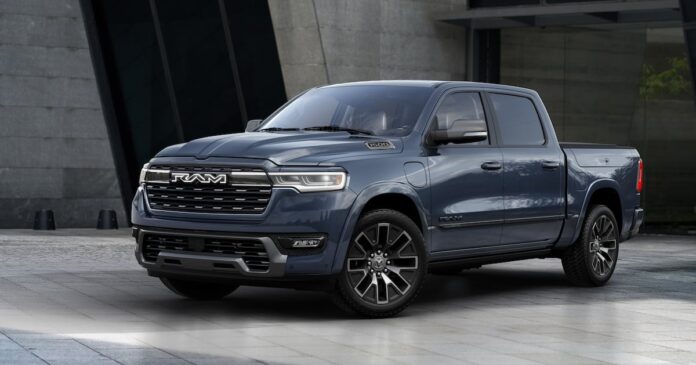Both electric pickups boast range figures of more than 300 miles in some configurations.
Unfortunately, real-world truck buyers find that the trucks don’t live up to that range when doing truck things.
In a recent test, Motor Trend found that an F-150 Lightning’s range dropped from 310 miles to 150 once a trailer was attached – then to 98 after just 5 miles of towing. News reports had one Florida construction company trading in a fleet of Lightning pickups after finding that hauling and towing cut the range too much to make them practical.
Credit: SPECIAL
Credit: SPECIAL
There’s not much new in that. Gas-powered trucks lose range dramatically when towing, too. But it’s more of an issue with an electric pickup , where refilling at a charging station can take an hour or more, even under the best circumstances.
That’s why Ram’s newest truck is the most exciting new car of 2025. Ram uses a very mature technology to solve the problem. The company could finally make electric trucks practical — by adding a gasoline engine.
Meet the 2025 Ram 1500 Ramcharger. (No, not that Ramcharger — Dodge sold a large SUV under that name from 1974 to 1993.)
The undisputed champions of the towing world aren’t Ram, Ford or Chevy trucks. They aren’t trucks at all. They’re diesel locomotives.
But diesel locomotives have much to teach us about how a great truck could work.
Credit: Stellantis
Credit: Stellantis
The strongest-pulling trucks on the market, diesel-powered heavy-duty models equipped with towing packages, pull about five times their weight.
Diesel-electric locomotives routinely pull more than 15 times theirs.
What makes these locomotives so much stronger? There’s a clue right there in the name: they’re electric.
A modern diesel-electric locomotive has a massive diesel engine, but this powerplant has no mechanical connection to the wheels. It’s just a generator. All the engine does is power the electrical system that drives the wheels. Electric motors can provide far more torque than any gas- or diesel-powered engine.
So why not build a train as a pure electric vehicle? Because its battery would deplete too fast to get it very far.
Since the 1920s, U.S. trains have been hybrids. They use their diesel engines to recharge their batteries and their torque-rich electric motors to do the actual pulling.
The Ramcharger steals this trick. It’s essentially an electric truck with a gas-powered generator onboard. Yes, it’s like a bad meme from the comments section of an EV article on Facebook, but it’s the best of both worlds.
Ram markets the Ramcharger as an odd EV but make no mistake: It’s more like a locomotive than a Cybertruck.
“I call it a battery-electric vehicle with an onboard generator,” Ram CEO Tim Kuniskis told us at a launch event for the truck.
In day-to-day driving, you can treat it like an electric truck. Its 92-kWh battery delivers about 145 miles of range between charging sessions, Ram says. Two electric motors give it 663 horsepower and 615 lb-ft of torque – good for a 14,000-pound towing capacity.
Credit: © 2023 Stellantis
Credit: © 2023 Stellantis
An old-fashioned V6 rumbles along under the hood. You could call it a plug-in hybrid (PHEV) and not be wrong. However, unlike other PHEVs, that engine has no mechanical connection to the wheels. It’s just there to recharge the batteries on the fly. You know – like a locomotive. The auto industry refers to this configuration as an “EREV” – an extended-range electric vehicle. Car people rarely encounter an acronym they don’t like.
Why a V6? Because Ram, effectively, had them lying around. Any engine can work as a generator, so Ram simply uses a proven design it can already build easily.
Ram hasn’t said what towing does to the electric range. We’re sure the numbers aren’t good.
However, unlike with a Lightning or a Cybertruck, they don’t matter. You can tow with your Ramcharger anywhere you have access to gasoline.
That gives drivers the best of both worlds. They can enjoy all the quickness and cutting-edge technology of an EV and bypass the gas station almost daily. But, when it’s time to hitch up the camper or the boat, you can depend on gasoline to help you tow.
We get attached to our cars like family members and admire them like art. That can make us forget that, fundamentally, they’re just tools.
No one argues whether a screwdriver is better than a wrench. It’s the wrong question. Each tool has its uses.
No one understands tools like truck owners. So, truck owners should be able to see the logic in a vehicular multitool.
I haven’t had a chance to drive the Ramcharger yet. No one in the media has.
Perhaps we’ll find some concerns when we do. On paper, it’s a candidate for the most exciting new truck of the year. It gives you all the advantages of an electric truck but solves their major problem — with a gasoline engine.
Sean Tucker reports for Kelley Blue Book from Washington, D.C., where he has covered the auto and energy industries for a quarter-century.
The Steering Column is a weekly consumer auto column from Cox Automotive. Cox Automotive and The Atlanta Journal-Constitution are owned by parent company, Atlanta-based Cox Enterprises.


